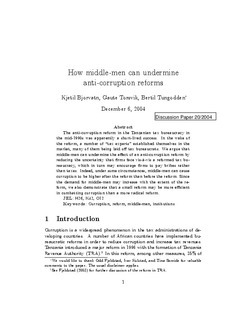How middle-men can undermine anti-corruption reforms
Working paper
Permanent lenke
http://hdl.handle.net/11250/162772Utgivelsesdato
2004-12Metadata
Vis full innførselSamlinger
- Discussion papers (SAM) [657]
Sammendrag
The anti-corruption reform in the Tanzanian tax bureaucracy in
the mid-1990s was apparently a short-lived success. In the wake of
the reform, a number of “tax experts” established themselves in the
market, many of them being laid off tax bureaucrats. We argue that
middle-men can undermine the effect of an anti-corruption reform by
reducing the uncertainty that firms face vis-à-vis a reformed tax bureaucracy,
which in turn may encourage firms to pay bribes rather
than taxes. Indeed, under some circumstances, middle-men can cause
corruption to be higher after the reform than before the reform. Since
the demand for middle-men may increase with the extent of the reform,
we also demonstrate that a small reform may be more efficient in combatting corruption than a more radical reform.
Utgiver
Norwegian School of Economics and Business Administration. Department of EconomicsSerie
Discussion paper2004:20
